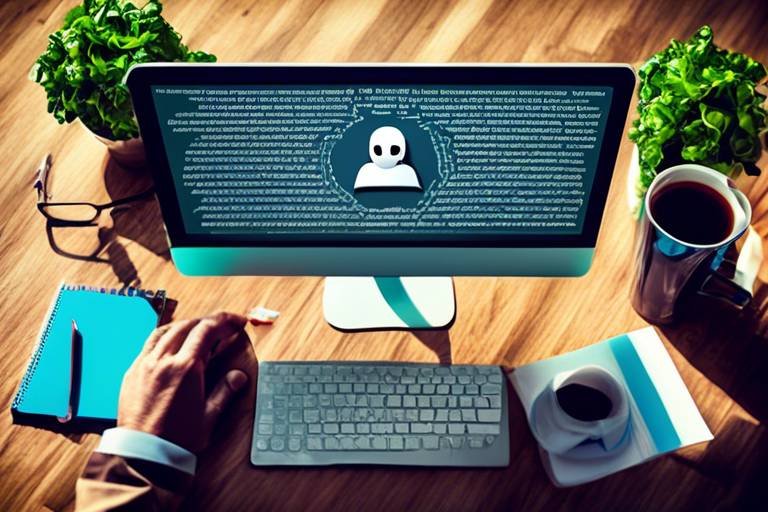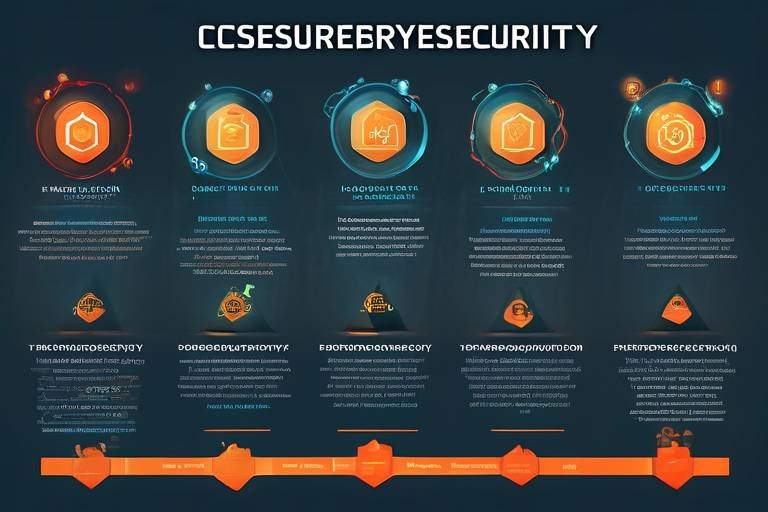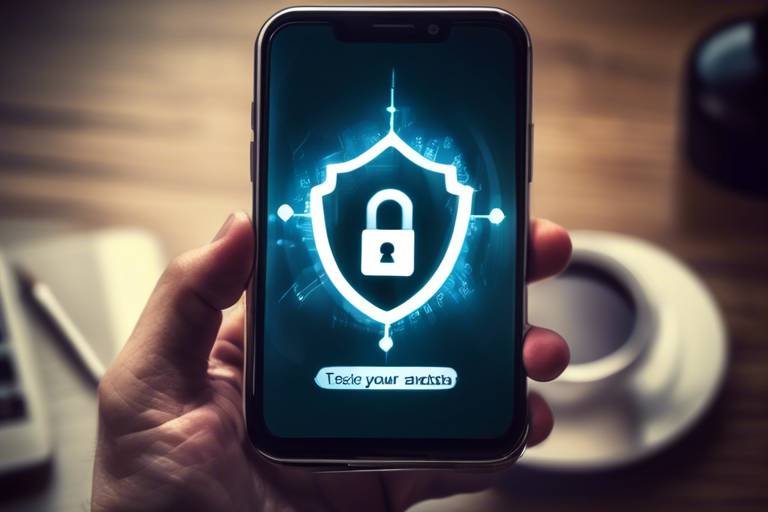Privacy Concerns with Mobile Apps - What You Should Know
In today's digital age, mobile apps have become an integral part of our daily lives. From social networking to online banking, we rely on these applications for convenience and connectivity. However, this reliance comes with significant privacy concerns. As users, it’s essential to be aware of the risks associated with sharing our personal information through these apps. The reality is that many mobile applications collect, store, and share data in ways that can compromise our privacy. This article aims to shed light on critical privacy issues linked to mobile apps, emphasizing the importance of user awareness and the steps we can take to safeguard our personal information.
When you download a mobile app, it often requests various permissions that allow it to access sensitive user data. These permissions can range from accessing your camera and microphone to tracking your location and reading your contacts. Understanding these permissions is crucial for users to make informed decisions about what information they are comfortable sharing. For instance, while a photo editing app might need access to your camera, does a simple flashlight app really need to know your location? By scrutinizing these requests, users can better protect their privacy and only grant permissions that are absolutely necessary.
Data collection practices by mobile apps can pose significant privacy risks. Many users are unaware of how their data is collected, stored, and utilized by app developers. Often, apps track user behavior to enhance their services or for targeted advertising, which can lead to a feeling of being constantly monitored. It’s essential for users to understand that their data is a valuable asset, and once shared, it can be difficult to retract. This data can be aggregated and analyzed, leading to insights that may not only affect advertising but also personal privacy.
Mobile apps can collect a wide array of data, including:
- Location: Many apps use GPS technology to provide location-based services.
- Contacts: Some apps request access to your contact list, which can lead to privacy breaches.
- Usage Patterns: Apps often track how you use them, gathering data on your habits and preferences.
Understanding what types of data are commonly collected helps users gauge their privacy exposure. For example, a navigation app needs your location data to function correctly, but a simple game may not require such access. Being aware of these distinctions is key to maintaining control over your personal information.
One of the most concerning aspects of mobile app data collection is location tracking. Many apps utilize this feature to provide tailored experiences, but it can significantly compromise user privacy. Users should evaluate the necessity of location access for the apps they use regularly. Ask yourself: is this app really benefiting from knowing where I am? If not, consider disabling location services or limiting access to only when the app is in use.
Apps that request access to your contacts can pose serious privacy threats. When you grant access, you not only share your information but also that of your friends and family. It’s crucial to consider whether sharing this information is necessary for the app's functionality. If an app requires access to your contacts to work, ensure it’s a reputable service that prioritizes data security.
Another significant concern is that apps often share user data with third-party companies for advertising or analytics purposes. This practice can lead to a lack of control over how your personal information is used and who it is shared with. By understanding these practices, users can take steps to protect their personal information. Always read the privacy policy of an app to understand how your data will be used and shared.
Implementing best practices can significantly enhance user privacy while using mobile apps. Awareness and proactive measures are essential for safeguarding personal data. Here are some effective strategies:
It’s wise for users to regularly review and manage app permissions to ensure only necessary data is shared. This practice helps minimize potential privacy risks. For instance, if you notice an app requesting access to your microphone but you never use that feature, it might be time to revoke that permission.
Opting for privacy-focused apps can provide better data protection. Users should consider alternatives that prioritize user privacy and have transparent data policies. Look for apps that openly communicate how they handle data and offer features that enhance privacy, such as end-to-end encryption.
Understanding legal regulations surrounding data privacy can empower users. Familiarity with these laws helps individuals exercise their rights regarding personal information. In many regions, users have specific rights that protect their data and dictate how companies can use it.
The GDPR sets stringent guidelines for data protection in the EU. It grants users rights such as the right to access their data, the right to be forgotten, and the right to data portability. Users should be aware of these rights when using mobile apps, as they can help ensure their data is handled appropriately.
The CCPA provides California residents with specific rights concerning their personal information, including the right to know what personal data is being collected and the right to opt-out of the sale of their data. Understanding these rights can help users make informed choices about their data and hold companies accountable for their practices.
Q: How can I check what permissions an app has on my phone?
A: You can usually find this information in your phone's settings under 'Apps' or 'Application Manager.' Select the app in question to view its permissions.
Q: What should I do if I feel an app is misusing my data?
A: You should report the app to the app store and consider uninstalling it. Additionally, you can reach out to the app developer for clarification on their data practices.
Q: Are there apps that are completely safe to use?
A: While no app can guarantee complete safety, choosing reputable apps with strong privacy policies and good user reviews can significantly reduce your risk.

Understanding Mobile App Permissions
In today's digital landscape, mobile apps have become an integral part of our daily lives. From social media platforms to productivity tools, these applications offer a plethora of functionalities that enhance our experiences. However, with great power comes great responsibility, and that’s where mobile app permissions come into play. When you download an app, it often requests access to various features on your device, such as your camera, microphone, location, and contacts. But have you ever paused to think about what that really means for your privacy?
Understanding mobile app permissions is crucial for users to make informed decisions about what information they share. When an app requests permission, it’s not just a simple formality; it’s a gateway to your personal data. For instance, if a photo editing app asks for access to your camera and photo gallery, it seems reasonable. But what if a game requests access to your contacts? This is where users need to raise an eyebrow and evaluate the necessity of such permissions.
To help you navigate this complex web of permissions, here’s a quick overview of some common types of permissions that mobile apps might request:
| Permission Type | Description | Why It's Requested |
|---|---|---|
| Camera | Access to capture photos or videos | Used for photo sharing or video calls |
| Location | Access to GPS data | Used for navigation or location-based services |
| Contacts | Access to contact list | Used for social features or inviting friends |
| Microphone | Access to audio input | Used for voice commands or recording |
As a user, it’s essential to be proactive. Before granting permissions, ask yourself: "Is this permission necessary for the app's core functionality?" If an app is asking for something that seems excessive or unrelated to its purpose, it might be time to reconsider. Always remember, just because an app requests permission doesn’t mean you have to grant it. You have the power to control what information you share.
Moreover, mobile operating systems are increasingly providing tools to help users manage these permissions more effectively. For example, both iOS and Android allow you to view and modify app permissions after installation. This means you can go back and revoke permissions that you feel are unnecessary. Regularly reviewing these permissions is a smart practice that can help you maintain your privacy and keep your personal information secure.
In conclusion, understanding mobile app permissions is not just about being savvy with technology; it’s about protecting your personal data in an age where information is power. By being aware of what permissions you grant and why, you can take control of your digital footprint and enjoy your apps without compromising your privacy.

The Risks of Data Collection
In today's digital landscape, the risks associated with data collection by mobile applications are more significant than ever. As users, we often overlook the fine print when we download an app, clicking "Accept" without a second thought. But what does that really mean for our privacy? The truth is, many apps collect a plethora of data that can be used in ways we might not fully understand or agree with. From our browsing habits to our location, the information we provide can be a goldmine for app developers and third parties alike.
One of the most alarming aspects of data collection is how it can lead to identity theft and other forms of cybercrime. When personal information is collected and stored, it becomes vulnerable to breaches. Imagine your most sensitive data—like your social security number or banking details—falling into the wrong hands. This nightmare scenario is not just a figment of our imagination; it happens more often than we think. In fact, according to recent studies, a significant percentage of mobile apps do not adequately secure the data they collect.
Moreover, the data collected is often not just limited to what we willingly provide. Many apps employ tracking technologies that can gather information without our explicit consent. This includes:
- Location Data: Apps can track your movements, revealing where you go and when.
- Usage Patterns: How often you open the app, what features you use, and how long you stay can all be monitored.
- Device Information: Data about your device, including its model, operating system, and even unique identifiers, can be collected.
Each of these data points can be used to create a detailed profile of you as a user, which can then be sold to advertisers or used for targeted marketing campaigns. This brings us to another significant concern: data sharing with third parties. When you agree to an app's terms and conditions, you may unknowingly grant permission for your data to be shared with various companies. These third parties may not have the same stringent privacy policies, increasing the risk of your data being mishandled.
In essence, the risks of data collection are multi-faceted, ranging from personal privacy invasion to potential identity theft. It’s crucial for users to be aware of these risks and to take proactive measures to protect their information. By understanding how data is collected and used, we can make more informed decisions about the apps we choose to download and use.
1. What types of data do mobile apps typically collect?
Most mobile apps collect a variety of data, including personal information (like your name and email), location data, usage patterns, and device information.
2. How can I protect my data when using mobile apps?
You can protect your data by regularly reviewing app permissions, opting for privacy-focused apps, and being cautious about the information you share.
3. Are all apps transparent about their data collection practices?
Unfortunately, not all apps are transparent. It’s essential to read the privacy policy and terms of service before downloading an app.
4. What should I do if I suspect my data has been compromised?
If you believe your data has been compromised, you should change your passwords, enable two-factor authentication, and monitor your accounts for any suspicious activity.

Types of Data Collected
When you download and use mobile applications, it's crucial to understand the various types of data these apps can collect. This knowledge not only empowers you as a user but also helps you make informed decisions about your privacy. Mobile apps can gather a wide array of information, far beyond what you might initially expect. For example, they often track your location, access your contacts, and monitor your usage patterns. Each of these data types carries its own set of privacy implications, and being aware of them can significantly enhance your ability to protect your personal information.
To further illustrate, let’s break down some of the most common types of data collected by mobile apps:
- Location Data: Many apps request access to your GPS location. This can be useful for navigation or location-based services, but it can also expose your whereabouts to third parties.
- Contact Information: Some apps ask for access to your contact list. While this may be necessary for certain functionalities, it raises questions about how that information is stored and used.
- Usage Patterns: Apps often track how you interact with them, including the features you use most frequently and the time spent on the app. This data can be used to improve the user experience, but it can also be shared with advertisers.
- Device Information: Apps may collect data about your device, such as its model, operating system, and unique identifiers. This information can help developers optimize their apps but can also be a privacy concern.
Understanding these data types is essential. For instance, consider location tracking. While it can enhance user experience in apps like maps or ride-sharing, it can also lead to unwanted surveillance if misused. Similarly, granting contact access to a social networking app might seem harmless, but it can potentially expose your friends' information without their consent.
In summary, being aware of the types of data collected by mobile apps is the first step in safeguarding your privacy. Always ask yourself: Is this data necessary for the app's functionality? If the answer is no, consider denying access or looking for alternatives that respect your privacy.
- What types of data do mobile apps commonly collect? Mobile apps typically collect location data, contact information, usage patterns, and device information.
- How can I manage app permissions? You can manage app permissions through your device settings, allowing you to control what data each app can access.
- Are there apps that prioritize user privacy? Yes, there are several privacy-focused apps available that have transparent data policies and prioritize user security.
- What should I do if I suspect an app is misusing my data? If you suspect misuse, you should revoke its permissions, uninstall the app, and report it to the relevant authorities.

Location Tracking
Location tracking has become a common feature in many mobile applications, but it raises significant privacy concerns that every user should be aware of. When you download an app, you might notice a request for permission to access your device's location. While this feature can enhance user experience—like providing navigation services or local recommendations—it also opens the door to potential misuse of your personal data. Imagine walking around your city, and every time you check your phone, the app is not just tracking your route but also collecting data about your habits, favorite spots, and even your daily routines. This information can be incredibly valuable to marketers and third-party companies.
Many apps utilize location tracking to provide personalized experiences, but it’s essential to ask yourself: Do I really need to share my location with this app? For instance, a fitness app might require your location to track your runs, but a simple game likely doesn't need that information. Users should critically evaluate the necessity of location access for each app they use regularly. If an app is requesting your location but doesn't seem to have a legitimate need for it, it might be a red flag.
Furthermore, consider the long-term implications of allowing location access. Your location data can be stored and analyzed, leading to a detailed profile of your movements over time. This can expose you to risks such as stalking or unwanted targeted advertising. To help users navigate these concerns, here's a brief overview of the types of location data that can be collected:
| Type of Location Data | Description |
|---|---|
| Real-Time Location | Tracks your current location as you move. |
| Location History | Records your past locations over time. |
| Geofencing Data | Triggers actions when you enter or exit specific areas. |
To safeguard your privacy, it’s advisable to regularly review your location settings. Most smartphones allow you to manage app permissions easily, enabling you to restrict access to only those applications that genuinely need it. Additionally, consider utilizing features like location sharing options that allow you to grant access temporarily or only while using the app. This way, you can enjoy the benefits of location services without compromising your privacy.
- What types of apps typically request location access? Many apps that provide navigation, weather updates, or local services request location access. However, social media and gaming apps may also ask for this information.
- Can I use apps without sharing my location? Yes, many apps allow you to use their services without sharing your location. Always check the app's settings for options to disable location tracking.
- What should I do if I suspect my location data is being misused? If you believe your data is being misused, consider uninstalling the app and reporting it to the app store. You can also review your privacy settings to revoke access.

Contact Information Access
When you download and install a mobile app, it often requests access to various features on your device, including your contacts. This request can raise eyebrows, as many users wonder why an app that serves a specific purpose—like a photo editor or a game—needs to access their personal contact list. The truth is, granting access to your contacts can lead to significant privacy concerns.
Apps that request contact information typically do so for a few reasons. For instance, social networking apps may need access to help you connect with friends easily. However, this access could also mean that your contact details are stored on their servers, shared with third parties, or even misused. It's like handing over your address book to someone you barely know—would you do that?
Here are some potential risks associated with granting contact information access:
- Data Breaches: If an app's security is compromised, your personal contacts could be exposed to malicious actors.
- Unwanted Marketing: Your contacts may end up being sold to advertisers, leading to unwanted spam or marketing calls.
- Privacy Violations: Some apps may utilize your contacts for purposes beyond their stated functionality, leading to potential misuse of your personal data.
So, what can you do to protect yourself? First, always ask yourself if the app truly needs access to your contacts. If not, it's wise to deny that permission. Most apps will still function properly without access to your contact list. Additionally, regularly reviewing app permissions can help you maintain control over your personal information. Just because you granted access once does not mean you have to keep it that way.
In conclusion, while contact information access can enhance the functionality of certain apps, it also poses significant risks to your privacy. Being informed and cautious about what information you share is crucial in today’s digital landscape. Always prioritize your personal data security, and don’t hesitate to hit that deny button if you feel uncomfortable.
- Why do apps ask for access to my contacts? Apps may request access to contacts to facilitate social features or improve user experience, but it's essential to evaluate whether this access is necessary.
- Can I use an app without granting access to my contacts? Yes, many apps can function without access to your contacts. You can often deny this permission without losing core functionality.
- What should I do if I suspect my contact information has been misused? If you believe your information has been misused, consider changing your privacy settings, reporting the app, and monitoring your contacts for any unusual activity.

Data Sharing with Third Parties
In today's digital age, the term "data sharing" has become almost synonymous with mobile applications. When you download an app, you might not think twice about the small print that allows the app to share your information with third-party companies. But hold on a second—this is where things can get a little dicey. It's crucial to understand that when you use an app, you're often giving it permission to share your data with other entities, which can lead to serious privacy concerns.
First off, let’s break down what this data sharing usually involves. Mobile apps often collect user data to enhance their services, but they may also sell or share this data with advertisers and analytics firms. This means that your personal information—like your browsing habits, location data, and even your contact lists—can end up in the hands of companies you’ve never even interacted with. This is not just a breach of trust; it can also expose you to targeted ads that feel eerily personal, and sometimes, even identity theft.
To illustrate this further, consider the following table that outlines common types of data shared with third parties:
| Type of Data | Purpose of Sharing |
|---|---|
| Location Data | Used for targeted advertising based on your geographic area. |
| Usage Patterns | Helps companies understand user behavior and improve app functionality. |
| Contact Information | May be shared with social media platforms for friend suggestions. |
| Payment Information | Often shared with payment processors and financial institutions for transaction purposes. |
Now, you might be wondering: "How can I protect myself from this?" The answer lies in being vigilant. Many apps provide options to limit data sharing in their settings. Make it a habit to dive into app settings and toggle off any permissions that seem unnecessary. Additionally, reading the privacy policy of each app can give you valuable insight into how your data is being used and shared. Remember, knowledge is power!
Moreover, it’s essential to be cautious about the apps you choose to install. Opt for applications that are transparent about their data-sharing practices. Look for apps that have robust privacy policies and prioritize user consent. After all, your data is valuable, and you should have a say in who gets to use it.
In conclusion, while data sharing with third parties is a common practice among mobile apps, it doesn't have to be a cause for alarm. By staying informed and proactive, you can take control of your personal information. Always ask yourself: Is this app worth the data I'm sharing? If the answer is no, it might be time to look for alternatives.
- What types of data do mobile apps typically share with third parties? Most apps share location data, usage patterns, and contact information.
- How can I limit data sharing on my mobile apps? Regularly review app permissions in your settings and read the privacy policies.
- Are there apps that prioritize user privacy? Yes, many privacy-focused apps are available that limit data sharing and have clear privacy policies.

Best Practices for Protecting Privacy
In today's digital age, where mobile apps are an integral part of our daily lives, safeguarding your privacy is more important than ever. You might be wondering, "How can I protect my personal information while still enjoying the convenience of these apps?" The answer lies in adopting a few best practices that can significantly enhance your privacy. First and foremost, it’s essential to regularly review the permissions granted to your apps. Many users, in their excitement to try out a new app, tend to overlook the permissions that the app requests. This can lead to sharing sensitive information unnecessarily. By going into your device settings and checking each app's permissions, you can ensure that only the necessary data is shared. For instance, if a weather app requests access to your contacts, you might want to reconsider whether that’s truly necessary.
Another vital practice is to opt for privacy-focused apps. Not all apps are created equal, and some prioritize user privacy much more than others. When searching for alternatives, look for apps that have transparent data policies and prioritize user consent. For example, there are several messaging apps that offer end-to-end encryption, ensuring that your conversations remain private. By choosing these types of applications, you not only protect your data but also support developers who value user privacy.
Additionally, consider using a virtual private network (VPN) when accessing the internet through mobile apps. A VPN encrypts your internet connection, making it much harder for third parties to track your online activities. This added layer of security can be particularly beneficial when using public Wi-Fi networks, which are often less secure. Furthermore, always keep your device and apps updated. Developers frequently release updates that address security vulnerabilities, so staying current can help protect your data from potential threats.
Moreover, educating yourself about data privacy laws can empower you to make informed decisions. Being aware of your rights, such as those outlined in the General Data Protection Regulation (GDPR) or the California Consumer Privacy Act (CCPA), can help you understand how your data is being used and what recourse you have if it’s misused. For instance, under these regulations, you have the right to request access to your data or even demand its deletion. Knowing this can help you take control of your personal information.
In summary, protecting your privacy while using mobile apps requires a combination of vigilance and proactive measures. By regularly reviewing app permissions, choosing privacy-focused alternatives, using a VPN, keeping your apps updated, and understanding your rights, you can enjoy the benefits of mobile technology without compromising your personal data. Remember, in the world of mobile apps, knowledge is your best defense against privacy breaches.
- What should I do if an app is requesting too many permissions? If an app is requesting permissions that seem excessive or unnecessary, it’s best to either deny those permissions or consider uninstalling the app.
- Are there apps that don’t collect data? While most apps collect some data, there are privacy-focused alternatives available that minimize data collection and prioritize user privacy.
- How can I tell if an app is privacy-focused? Look for apps that have clear privacy policies, are transparent about their data practices, and offer features like end-to-end encryption.
- What is a VPN and how does it help? A VPN, or virtual private network, encrypts your internet connection, making it more secure and helping to protect your data from prying eyes.

Reviewing App Permissions Regularly
In today's digital age, where mobile applications have become an integral part of our daily lives, it is essential to understand the permissions that these apps request. Regularly reviewing app permissions is not just a good practice; it is a critical step in safeguarding your personal information. Think of your smartphone as a treasure chest, and each app is a key that can unlock different compartments of your valuable data. By allowing an app access to certain permissions, you are essentially handing over a key that may open doors you never intended to let them through.
When you first download an app, it often requests various permissions, such as access to your camera, microphone, contacts, and location. While some of these permissions are necessary for the app to function correctly, others may be excessive or even intrusive. For instance, why would a simple flashlight app need access to your contacts? This is where the importance of regular reviews comes into play. By periodically checking the permissions you have granted, you can identify any that seem unnecessary or suspicious.
To make this process easier, many smartphones now provide a centralized location where you can view and manage app permissions. Here’s a quick guide on how to do it:
- For Android: Go to Settings > Apps & notifications > App permissions. Here, you can see which apps have access to specific data and adjust settings accordingly.
- For iOS: Navigate to Settings > Privacy. You’ll find a list of permissions, such as Location Services, Contacts, and Photos, where you can see which apps have access to what.
After reviewing your app permissions, consider these actions:
- **Revoke unnecessary permissions**: If an app requests access to something it doesn’t need, don’t hesitate to deny it.
- **Uninstall unused apps**: If you haven't used an app in a while, uninstalling it can help reduce your risk of data exposure.
- **Stay informed**: Keep up with updates related to the apps you use. Developers often change their data policies, so it's good to stay in the loop.
Taking the time to review app permissions regularly can significantly enhance your privacy and security. It's like giving your treasure chest a thorough inspection to ensure that all keys are accounted for and that no one has access to compartments they shouldn’t. Remember, your data is valuable, and being proactive about your privacy can help you avoid potential risks that come with data misuse.
1. Why should I review app permissions?
Regularly reviewing app permissions helps you understand what data you are sharing and with whom. It allows you to revoke access to unnecessary permissions, thereby enhancing your privacy.
2. How often should I review my app permissions?
It's a good practice to review your app permissions at least once every few months or whenever you download a new app.
3. What should I do if I find an app with excessive permissions?
If you find an app that requests more permissions than necessary, consider revoking those permissions or uninstalling the app altogether.
4. Are there apps that prioritize user privacy?
Yes, there are several privacy-focused apps available that limit data collection and have transparent privacy policies. Researching and opting for these can help protect your personal information.

Using Privacy-Focused Apps
In today's digital landscape, where our personal information is constantly at risk, using privacy-focused apps has become more than just a trend; it's a necessity. These applications are designed with user privacy in mind, ensuring that your data isn't exploited for profit or shared without your consent. But what exactly makes an app "privacy-focused"? It's not just about having a fancy logo or a catchy tagline; it involves a commitment to transparent data practices and robust security measures.
When you choose a privacy-focused app, you are opting for a solution that minimizes data collection and prioritizes your control over personal information. For example, many of these apps limit the amount of data they collect to only what is essential for functionality. This means that instead of gathering every piece of information they can, they focus on what truly matters. Imagine walking into a store where the owner only asks for your name and purpose of visit instead of your entire life story—that's the essence of privacy-focused apps.
Some popular categories of privacy-focused apps include:
- Messaging Apps: Look for options like Signal or Telegram, which offer end-to-end encryption, ensuring that only you and the person you’re communicating with can read your messages.
- Web Browsers: Consider using browsers like Brave or Firefox, which block trackers and ads by default, giving you a cleaner and safer browsing experience.
- VPN Services: A Virtual Private Network (VPN) can mask your IP address, making it harder for third parties to track your online activities. Apps like NordVPN or ExpressVPN are popular choices.
Moreover, many of these apps have clear and concise privacy policies that outline what data they collect, how it's used, and if it's shared with third parties. This transparency is crucial because it empowers users to make informed decisions. Just like reading the label on a food product before consuming it, understanding an app's privacy policy can help you determine whether it aligns with your privacy expectations.
However, it's essential to do your research before downloading any app. Look for reviews and recommendations from trusted sources, and consider the app's track record regarding user privacy. Are there any red flags? Have they faced data breaches in the past? These questions can guide you toward making a well-informed choice.
In conclusion, opting for privacy-focused apps is a proactive step towards safeguarding your personal data in an increasingly invasive digital world. By taking control of your app choices, you can navigate the online landscape with greater confidence and peace of mind. Remember, your privacy is your right, and using the right tools can help you protect it.
1. What are privacy-focused apps?
Privacy-focused apps are applications designed to prioritize user privacy by minimizing data collection and ensuring transparent data practices.
2. Why should I use privacy-focused apps?
Using privacy-focused apps helps protect your personal information from being exploited or shared without your consent, giving you more control over your data.
3. Are all free apps privacy-focused?
Not necessarily. Many free apps rely on advertising revenue and may collect extensive user data. It's crucial to read the privacy policies before downloading.
4. Can I trust privacy-focused apps?
While many privacy-focused apps are reputable, it's important to research their background, read reviews, and check their privacy policies to ensure they align with your expectations.

Legal Regulations and User Rights
The world of mobile apps is not just about convenience and entertainment; it also involves a complex web of legal regulations designed to protect user privacy. Understanding these laws is crucial for anyone navigating the digital landscape, as they empower users to take control of their personal information. It’s a bit like having a safety net while walking a tightrope—knowing your rights can help you balance the risks of sharing your data with various applications.
One of the most prominent regulations in the realm of data protection is the General Data Protection Regulation (GDPR). Enforced in the European Union, the GDPR sets a high standard for how personal data should be handled. It grants users several rights, including:
- The Right to Access: Users can request access to their personal data held by organizations.
- The Right to Rectification: Users can ask for corrections to their data if it is inaccurate or incomplete.
- The Right to Erasure: Also known as the "right to be forgotten," this allows users to request the deletion of their data under certain conditions.
- The Right to Data Portability: Users can request their data in a structured, commonly used format to transfer it to another service.
These rights are designed to give users more control over their personal information, ensuring that they are not left in the dark about how their data is used. For instance, if an app collects data without clear consent, users can invoke these rights to challenge such practices. It’s like having a flashlight in a dark room; you can shine a light on your data and see exactly what’s going on.
In the United States, the California Consumer Privacy Act (CCPA) serves as another significant piece of legislation aimed at protecting user privacy. This act grants California residents specific rights regarding their personal information, including:
- The Right to Know: Users can inquire about the personal data collected about them and how it is used.
- The Right to Delete: Users can request the deletion of their personal data held by businesses.
- The Right to Opt-Out: Users can opt-out of the sale of their personal information to third parties.
Understanding these regulations is not just for the tech-savvy; it’s essential for every app user. By familiarizing yourself with these rights, you can make informed choices about which apps to download and use. It’s like knowing the rules of a game before you play; it helps you strategize and avoid potential pitfalls. Moreover, being aware of these legal protections can foster a culture of accountability among app developers, encouraging them to prioritize user privacy in their practices.
In conclusion, as mobile apps continue to evolve, so too do the regulations that govern them. Staying informed about your legal rights can empower you to navigate the digital world more safely and confidently. So, the next time you download an app, take a moment to consider not just its features, but also the legal framework that protects your personal information. It’s a small step that can lead to a giant leap in safeguarding your privacy.
Q: What should I do if I believe my privacy rights have been violated?
A: You can file a complaint with the relevant data protection authority in your region or contact the app developer directly to address your concerns.
Q: Are all apps required to comply with GDPR or CCPA?
A: Not all apps are required to comply, but those that collect personal data from users in the EU or California must adhere to these regulations.
Q: How can I find out what data an app collects?
A: Most apps provide a privacy policy that outlines what data is collected, how it is used, and with whom it is shared. Always review this policy before downloading an app.

General Data Protection Regulation (GDPR)
The is a landmark legislation that was enacted in the European Union to enhance data protection and privacy for individuals. It came into effect on May 25, 2018, and has since set a global standard for how organizations handle personal data. But what does this mean for you as a mobile app user? Well, for starters, it gives you more control over your personal information and how it is used by apps and companies.
One of the key principles of the GDPR is the requirement for explicit consent. This means that before any app can collect your data, they must obtain your clear permission. You should never feel like your data is being taken from you without your knowledge. Apps are now required to provide transparent information about what data they are collecting and how it will be used. This transparency is crucial because it allows you to make informed decisions. For instance, if an app wants to track your location, it must explain why that data is necessary and how it will enhance your experience.
Moreover, the GDPR introduces several rights for users, which include:
- The Right to Access: You can request to see what personal data an app has collected about you.
- The Right to Rectification: If you find inaccuracies in your data, you can request corrections.
- The Right to Erasure: Also known as the "right to be forgotten," you can ask for your data to be deleted under certain conditions.
- The Right to Data Portability: You can request that your data be transferred to another service or app.
These rights empower you as a user, making it easier to manage your data and hold companies accountable. However, it’s important to note that not all apps may comply with GDPR, especially those based outside the EU. This is why being informed and vigilant about the apps you use is essential. Always check if the app has a privacy policy that outlines how they handle your data.
In summary, the GDPR represents a significant step towards protecting your privacy in the digital age. By understanding your rights and the obligations of app developers, you can navigate the mobile app landscape with greater confidence. Remember, your data is valuable, and you have every right to protect it!

California Consumer Privacy Act (CCPA)
The is a landmark piece of legislation that gives California residents enhanced rights over their personal information. Enacted in 2018, the CCPA aims to improve transparency around data collection practices and empower consumers to take control of their data. This act is particularly significant in today’s digital age, where personal information is often treated as a commodity. Under the CCPA, consumers have several rights that are crucial for protecting their privacy.
One of the key features of the CCPA is the requirement for businesses to disclose the types of personal information they collect and the purposes for which it is used. This means that when you download an app or sign up for a service, you should be informed about what data is being harvested. Businesses must also provide a clear option for consumers to opt out of the sale of their personal information, which is a game-changer in the realm of data privacy.
Here are some of the fundamental rights granted to California residents under the CCPA:
- The Right to Know: Consumers can request information about the personal data a business has collected about them, including the categories of data, the sources from which it was collected, and the business purposes for processing it.
- The Right to Delete: Consumers can ask businesses to delete their personal information, with some exceptions, such as when the data is necessary for compliance with a legal obligation.
- The Right to Opt-Out: Consumers can opt out of the sale of their personal information to third parties, providing more control over their data.
- The Right to Non-Discrimination: Businesses cannot discriminate against consumers who choose to exercise their rights under the CCPA, ensuring that opting out does not result in a lesser service or higher prices.
It's essential for consumers to be proactive in exercising these rights. Regularly reviewing the privacy policies of the apps and services they use can help them stay informed about their data practices. The CCPA also mandates that businesses must provide a "Do Not Sell My Personal Information" link on their websites, making it easier for users to opt out.
In summary, the CCPA represents a significant step towards greater consumer protection in the digital landscape. By understanding and utilizing the rights afforded to them, consumers can take a stand against intrusive data practices and safeguard their personal information. As mobile apps continue to proliferate, being informed about these rights is not just beneficial; it’s essential for maintaining one’s privacy in an increasingly connected world.
Here are some common questions regarding the California Consumer Privacy Act (CCPA) that may help clarify its implications further:
- What types of businesses are affected by the CCPA? The CCPA applies to businesses that collect personal information from California residents and meet certain thresholds, such as having annual gross revenues over $25 million.
- How can I exercise my rights under the CCPA? You can exercise your rights by submitting a request to the business, either through their website or by contacting them directly.
- Are there penalties for non-compliance with the CCPA? Yes, businesses that fail to comply with the CCPA may face penalties, including fines for violations.
Frequently Asked Questions
- What permissions do mobile apps typically request?
Mobile apps often ask for a range of permissions, including access to your location, contacts, camera, microphone, and storage. Each permission serves a specific purpose, but it’s essential to evaluate whether the app really needs that access to function properly.
- Why is it important to understand data collection practices?
Understanding how apps collect, store, and use your data is vital because it helps you gauge the potential risks to your privacy. Many apps collect more data than necessary, which can lead to unwanted exposure of your personal information.
- What types of data do mobile apps commonly collect?
Mobile apps can collect various types of data, including your location, contacts, browsing habits, and even your device information. Being aware of what data is collected can help you make informed decisions about which apps to use.
- How can I protect my privacy while using mobile apps?
To protect your privacy, regularly review and manage app permissions, opt for privacy-focused apps, and be cautious about sharing sensitive information. Implementing these practices can significantly reduce your risk of privacy breaches.
- What is the General Data Protection Regulation (GDPR)?
The GDPR is a comprehensive data protection law in the European Union that sets strict guidelines for how personal data should be handled. It gives users rights over their data, including the right to access and delete their information.
- What rights do I have under the California Consumer Privacy Act (CCPA)?
The CCPA gives California residents specific rights regarding their personal information, including the right to know what data is being collected, the right to request deletion, and the right to opt-out of data sales.
- Can I trust all mobile apps with my data?
Not all apps can be trusted equally. It's crucial to research the app developer, read user reviews, and understand the app's privacy policy before downloading and sharing your personal information.
- What should I do if I suspect my data has been compromised?
If you suspect your data has been compromised, immediately change your passwords, review your app permissions, and consider reporting the issue to the app store or relevant authorities. Staying proactive can help mitigate potential risks.



















